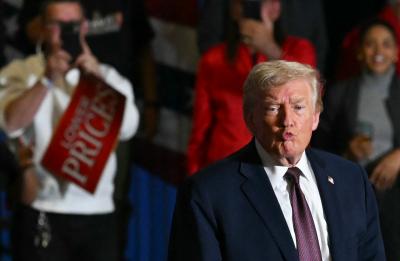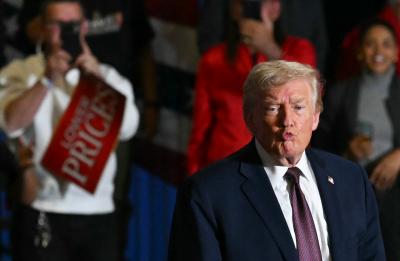U.S. President Donald Trump achieved the goals he had set for his recent Middle East tour—focused on the Gulf states and notably excluding Israel—without making any real progress on the Palestinian front.
While the trip marked a potential shift in Washington’s stance on the Gaza war, the Palestinian issue was far from a priority on the official agenda. Trump left the region after delivering vague, non-committal statements and making promises of ongoing efforts focused primarily on humanitarian concerns.
This outcome is not surprising. Despite the deep rift between Trump and Israeli Prime Minister Benjamin Netanyahu, the American president cannot simply force Netanyahu to halt the war. That said, Trump does genuinely seek to end the conflict and restore regional stability. His broader vision remains centered on achieving peace and normalization between Israel and Arab nations under the framework of the Abraham Accords—a process that cannot succeed without an acceptable solution for the Palestinian people.
Throughout Trump’s visit, Israel was conspicuously absent from the narrative, leaving Netanyahu feeling isolated and, arguably, the biggest loser of the trip. In response, he doubled down on his defiance, going so far as to declare that even if Hamas were to accept the deal proposed by U.S. envoy Steve Whitkoff, Gaza would witness unprecedented violence.
Netanyahu’s statement was designed to derail American and mediator efforts. But this time, his attempt backfired. U.S. officials pressed ahead with their diplomatic efforts in Doha and through international channels. In turn, Netanyahu escalated both his rhetoric and military actions, trying to influence negotiations and sabotage the process once more. He had already stripped his own negotiating team of any real authority, clearing the path for an expanded ground operation—yet stopping short of open defiance of Trump.
The unfolding events during Trump’s tour suggest that Netanyahu was acting under the assumption that he still had Trump’s unconditional support. In reality, Netanyahu and his circle harbor deep concerns over Trump’s recent positions, which they perceive as clashing with Israel’s core security interests.
There is no shortage of recent examples: Trump’s call for an end to the “horrific” war against Hamas, his openness to direct talks with the group, the orchestrated release of American hostage Edan Alexander, the lifting of sanctions on Syria and praise for Syrian President Ahmed al-Shara (a figure Netanyahu distrusts), and even a sudden reconciliation with Iran-backed Yemen. Most significantly, Trump appears willing to accept Iran as a peaceful nuclear state under its current regime—along with a noticeable softening of Washington’s stance in related negotiations.
Despite all this, Trump has not severed ties with the Israeli government. Though increasingly impatient with Netanyahu, he has delayed imposing a Gaza a settlement and continues to speak publicly about the need to dismantle Hamas’s rule. He still supports the Abraham Accords, albeit at a measured pace, aligning—at least rhetorically—with Netanyahu’s positions.
Yet these reassurances have not calmed Netanyahu’s critics in Israel. Frustration has spilled into the media, with leaks painting Trump as unpredictable—a brash, populist, theatrical, emotionally driven media figure who claims a monopoly on truth and often ignores diplomatic norms. Pro-Netanyahu media has increasingly focused on the “chaos” within the U.S. administration, particularly regarding the Iran issue—a sign that substantial developments may be underway.
Some members of the Israeli right have gone as far as to call for an "Israel First" policy, urging a reduction in reliance on U.S. aid. However, it's widely acknowledged that Israel cannot sustain a prolonged conflict without American support. And the notion that the Trump-Netanyahu rift alone explains current tensions is likely overstated.
Netanyahu, for his part, seems intent on continuing the war until Israel’s elections in roughly 18 months. Yet think tanks and research centers in Israel and abroad—many of which are staunchly pro-Israel—have been warning of the dangers of a war without clearly defined goals.
Calls for a Strategic Shift Starting in Gaza
The ongoing Israeli debate, which spans across political lines, reflects growing concern that the U.S.–Israel relationship may be shifting from a strategic asset for Washington to a liability—largely due to Netanyahu. Despite the extensive support offered by former President Joe Biden, including reluctant backing during Iran's attacks and all phases of the Gaza war following the Al-Aqsa Flood operation, Netanyahu has offered no meaningful concessions or flexibility in return.
The internal Israeli narrative also recalls the state's historical dependence on major world powers—from Britain to France and, most recently, the United States—to confront existential threats. After decades of near-total reliance on Washington, Israel can no longer afford to disregard broader American interests and simply keep saying no.
There is growing concern that Netanyahu and his allies risk turning Israel into a burden on the United States. The war, lacking a coherent strategy, has increasingly been seen by Trump as senseless and counterproductive—transforming Israel from a strategic ally into an obstacle to peace and mutual interests.
This perception—of chaos, short-sightedness, and unilateralism—has driven Trump to take matters into his own hands in Gaza, Yemen, Syria, and even in his dealings with Arab states. For the first time in decades, there is a genuine Israeli fear that the U.S.-Israel alliance is under threat.
As a result, more Israeli voices are now calling for a strategic pivot toward political solutions—starting with Gaza—and for the reinforcement of key alliances, foremost among them with the U.S. administration. They are urging Netanyahu to better understand the evolving dynamics of American politics, the essence of "Trumpism," and the transformation of the Republican Party. The old playbook—relying on the Jewish lobby, friendly lawmakers, or pressuring Congress—is no longer effective.
Netanyahu’s critical misstep, they argue, was assuming that defeating Biden was enough, without grasping the nature of “Trump 2.0.”
Please post your comments on:
[email protected]
 Politics
Politics












